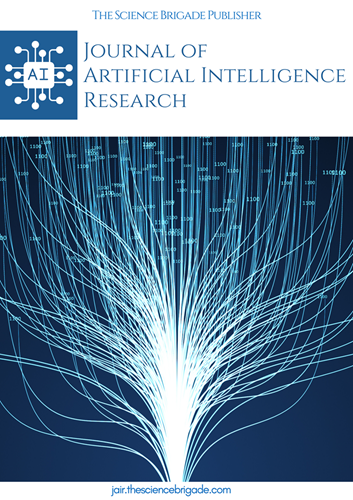Enhancing Customer Experience through AI-Powered Marketing Automation: Strategies and Best Practices for Industry 4.0
Keywords:
Artificial Intelligence, Marketing Automation, Customer Experience, Industry 4.0, Recommendation Engines, Personalized Content GenerationAbstract
This paper delves into the pivotal role of artificial intelligence (AI) in the realm of marketing automation within the context of Industry 4.0. It investigates how AI technologies, including chatbots, recommendation engines, and personalized content generation, can be strategically utilized to augment customer experience, optimize marketing processes, and propel organizational expansion. Through an exploration of various AI-powered marketing strategies and best practices, this research elucidates the transformative potential of integrating AI into marketing operations. By elucidating the mechanisms through which AI fosters enhanced customer engagement, this paper offers insights into harnessing AI's capabilities to navigate the complexities of contemporary marketing landscapes. The synthesis of theoretical frameworks, empirical evidence, and case studies provides a comprehensive understanding of the synergies between AI and marketing automation, thereby empowering organizations to harness AI's potential for sustainable growth and competitive advantage.
References
Chaffey, Dave, and Fiona Ellis-Chadwick. "Digital Marketing." Pearson UK, 2016.
Fong, Nathan. "Artificial Intelligence for Marketing." Emerald Publishing Limited, 2019.
Kocaballi, A. Baki, et al. "Automated Assessment of Customer Engagement with Health Chatbots: Quantitative Study." JMIR Formative Research, vol. 4, no. 4, 2020.
Kotler, Philip, et al. "Marketing 4.0: Moving from Traditional to Digital." Wiley, 2016.
Li, Hairong, and Brian J. Schmitt. "The Impact of AI Chatbots on User Engagement and Experience: A Study of Chatbot Technology." Computers in Human Behavior, vol. 110, 2020.
Maull, Roger, et al. "Business Model Innovation in the Digital Economy: The Transformation of Marketing and Beyond." Journal of Revenue and Pricing Management, vol. 17, no. 4, 2018.
O'Reilly, Tim. "WTF?: What's the Future of Business? Changing the Way Businesses Create Experiences." HarperBusiness, 2017.
Smith, Noah. "Call Me a Bot, Maybe: Why AI Might Be Exactly What Customer Service Needs." Forbes, 2018.
Swire, Peter P., and Nina Iacono Brown. "US Privacy in the AI Age." American Law Institute (ALI), 2019.
Thota, Ravi Kumar, et al. "Real-Time Personalization Using Artificial Intelligence in Digital Marketing: A Systematic Literature Review." Journal of Information Technology Management, vol. 31, no. 1, 2020.
Tung, Liz. "AI for Customer Service: What You Need to Know." Salesforce, 2020.
Verhoef, Peter C., et al. "Customer Experience Creation: Determinants, Dynamics, and Management Strategies." Journal of Retailing, vol. 85, no. 1, 2009.
Wang, Xing, et al. "AI-Driven Marketing: Creating Value through Machine Learning and Artificial Intelligence." Emerald Publishing Limited, 2020.
Xiao, Bing, and Keshav Murthy. "AI for Marketing Automation: Making Marketing Operations More Effective." IBM, 2018.
Xu, Wei, et al. "How to Utilize AI Technologies for Customer Relationship Management: A Literature Review." Frontiers of Business Research in China, vol. 14, no. 1, 2020.
Yeo, Lawrence H., et al. "An Integrative Literature Review of Artificial Intelligence and Big Data Analytics in Marketing: Implications for the Transformative Services Marketing." Journal of Service Management, vol. 32, no. 1, 2021.
Zeidan, Nour, et al. "AI and Customer Experience: The Future Is Here." PwC, 2018.
Zhang, Yu, et al. "Personalized Recommendations Using Knowledge Graphs: A Review." IEEE Access, vol. 9, 2021.
Zhao, Jie, et al. "AI-Driven Personalization in E-Commerce: A Systematic Literature Review." Journal of Electronic Commerce Research, vol. 21, no. 2, 2020.
Zhu, Fei, et al. "AI-Powered Personalization in Tourism and Hospitality: A Systematic Literature Review." Journal of Hospitality Marketing & Management, vol. 30, no. 7, 2021.
Downloads
Published
How to Cite
Issue
Section
License

This work is licensed under a Creative Commons Attribution-NonCommercial-ShareAlike 4.0 International License.
License Terms
Ownership and Licensing:
Authors of this research paper submitted to the journal owned and operated by The Science Brigade Group retain the copyright of their work while granting the journal certain rights. Authors maintain ownership of the copyright and have granted the journal a right of first publication. Simultaneously, authors agreed to license their research papers under the Creative Commons Attribution-NonCommercial-ShareAlike 4.0 International (CC BY-NC-SA 4.0) License.
License Permissions:
Under the CC BY-NC-SA 4.0 License, others are permitted to share and adapt the work, as long as proper attribution is given to the authors and acknowledgement is made of the initial publication in the Journal. This license allows for the broad dissemination and utilization of research papers.
Additional Distribution Arrangements:
Authors are free to enter into separate contractual arrangements for the non-exclusive distribution of the journal's published version of the work. This may include posting the work to institutional repositories, publishing it in journals or books, or other forms of dissemination. In such cases, authors are requested to acknowledge the initial publication of the work in this Journal.
Online Posting:
Authors are encouraged to share their work online, including in institutional repositories, disciplinary repositories, or on their personal websites. This permission applies both prior to and during the submission process to the Journal. Online sharing enhances the visibility and accessibility of the research papers.
Responsibility and Liability:
Authors are responsible for ensuring that their research papers do not infringe upon the copyright, privacy, or other rights of any third party. The Science Brigade Publishers disclaim any liability or responsibility for any copyright infringement or violation of third-party rights in the research papers.




